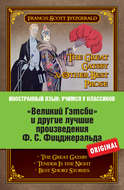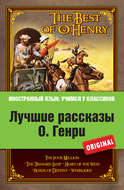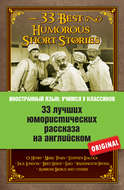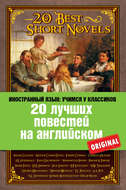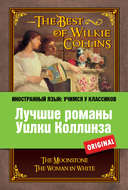Kitabı oku: «30 лучших рассказов британских писателей / 30 Best British Short Stories», sayfa 4
‘By the way, what is this story about your swearing at one of the waiters?’
‘You mean about his swearing at me,’ Myddleton Finch replied, reddening.
‘I am glad that was it,’ I said; ‘for I could not believe you guilty of such bad form.’
‘If I did swear–’ he was beginning, but I went on:
‘The version which has reached me was that you swore at him, and he repeated the word. I heard he was to be dismissed and you reprimanded.’
‘Who told you that?’ asked Myddleton Finch, who is a timid man.
‘I forget; it is club talk,’ I replied, lightly. ‘But of course the committee will take your word. The waiter, whichever one he is, richly deserves his dismissal for insulting you without provocation.’
Then our talk returned to the saddle, but Myddleton Finch was abstracted, and presently he said:
‘Do you know, I fancy I was wrong in thinking that the waiter swore at me, and I’ll withdraw my charge to-morrow.’
Myddleton Finch then left me, and, sitting alone, I realised that I had been doing William a service. To some slight extent I may have intentionally helped him to retain his place in the club, and I now see the reason, which was that he alone knows precisely to what extent I like myclaretheated.
For a mere second I remembered William’s remark that he should not be able to see the girl Jenny from the library windows. Then this recollection drove from my head that I had only dined in the sense that my dinner-bill was paid. Returning to the dining-room, I happened to take my chair at the window, and while I was eating a deviled kidney I saw in the street the girl whose nods had such an absurd effect on William.
The children of the poor are as thoughtless as their parents, and this Jenny did not sign to the windows in the hope that William might see her, though she could not see him. Her face, which was disgracefully dirty, bore doubt and dismay on it, but whether she brought good news it would not tell. Somehow I had expected her to signal when she saw me, and, though her message could not interest me, I was in the mood in which one is irritated at that not taking place which he is awaiting. Ultimately she seemed to be making up her mind to go away.
A boy was passing with the evening papers, and I hurried out to get one, rather thoughtlessly, for we have all the papers in the club. Unfortunately, I misunderstood the direction the boy had taken; but round the first corner (out of sight of the club windows) I saw the girl Jenny, and so asked her how William’s wife was.
‘Did he send you to me?’ she replied, impertinently taking me for a waiter. ‘My!’ she added, after a second scrutiny, ‘I b’lieve you’re one of them. His missis is a bit better, and I was to tell him as she took all the tapiocar.’
‘How could you tell him?’ I asked.
‘I was to do like this,’ she replied, and went through the supping of something out of a plate in dumb-show.
‘That would not show she ate all the tapioca,’ I said.
‘But I was to end like this,’ she answered, licking an imaginary plate with her tongue.
I gave her a shilling (to get rid of her), and returned to the club disgusted.
Later in the evening I had to go to the club library for a book, and while William was looking in vain for it (I had forgotten the title) I said to him:
‘By the way, William, Mr. Myddleton Finch is to tell the committee that he was mistaken in the charge he brought against you, so you will doubtless be restored to the dining-room to-morrow.’
The two members were still in their chairs, probably sleeping lightly; yet he had the effrontery to thank me.
‘Don’t thank me,’ I said, blushing at the imputation. ‘Remember your place, William!’
‘But Mr. Myddleton Finch knew I swore,’ he insisted.
‘A gentleman,’ I replied, stiffly, ‘cannot remember for twenty-four hours what a waiter has said to him.’
‘No, sir; but–’
To stop him I had to say: ‘And, ah, William, your wife is a little better. She has eaten the tapioca – all of it.’
‘How can you know, sir?’
‘By an accident.’
‘Jenny signed to the window?’
‘No.’
‘Then you saw her, and went out, and–’
‘Nonsense!’
‘Oh, sir, to do that for me! May God bl–’
‘William!’
‘Forgive me, sir; but – when I tell my missis, she will say it was thought of your own wife as made you do it.’
He wrung my hand. I dared not withdraw it, lest we should waken the sleepers.
William returned to the dining-room, and I had to show him that if he did not cease looking gratefully at me I must change my waiter. I also ordered him to stop telling me nightly how his wife was, but I continued to know, as I could not help seeing the girl Jenny from the window. Twice in a week I learned from this objectionable child that the ailing woman had again eaten all the tapioca. Then I became suspicious of William. I will tell why.
It began with a remark of Captain Upjohn’s. We had been speaking of the inconvenience of not being able to get a hot dish served after 1 A.M., and he said:
‘It is because these lazy waiters would strike. If the beggars had a love of their work they would not rush away from the club the moment one o’clock strikes. That glum fellow who often waits on you takes to his heels the moment he is clear of the club steps. He ran into me the other night at the top of the street, and was off without apologising.’
‘You mean the foot of the street, Upjohn,’ I said; for such is the way to Drury Lane.
‘No; I mean the top. The man was running west.’
‘East.’
‘West.’
I smiled, which so annoyed him that he bet me two to one in sovereigns. The bet could have been decided most quickly by asking William a question, but I thought, foolishly doubtless, that it might hurt his feelings, so I watched him leave the club. The possibility of Upjohn’s winning the bet had seemed remote to me. Conceive my surprise, therefore when William went westward.
Amazed, I pursued him along two streets without realising that I was doing so. Then curiosity put me into ahansom. We followed William, and it proved to be a three-shilling fare, for, running when he was in breath and walking when he was out of it, he took me to West Kensington.
I discharged my cab, and from across the street watched William’s incomprehensible behaviour. He had stopped at a dingy row of workmen’s houses, and knocked at the darkened window of one of them. Presently a light showed. So far as I could see, someone pulled up the blind and for ten minutes talked to William. I was uncertain whether they talked, for the window was not opened, and I felt that, had William spoken through the glass loud enough to be heard inside, I must have heard him too. Yet he nodded and beckoned. I was still bewildered when, by setting off the way he had come, he gave me the opportunity of going home.
Knowing from the talk of the club what the lower orders are, could I doubt that this was some discreditable love-affair of William’s? His solicitude for his wife had been mere pretence; so far as it was genuine, it meant that he feared she might recover. He probably told her that he was detained nightly in the club till three.
I was miserable next day, and blamed the deviled kidneys for it. Whether William was unfaithful to his wife was nothing to me, but I had two plain reasons for insisting on his going straight home from his club: the one that, as he had made me lose a bet, I must punish him; the other that he could wait upon me better if he went to bed betimes.
Yet I did not question him. There was something in his face that – Well, I seemed to see his dying wife in it.
I was so out of sorts that I could eat no dinner. I left the club. Happening to stand for some time at the foot of the street, I chanced to see the girl Jenny coming, and – no; let me tell the truth, though the whole club reads: I was waiting for her.
‘How is William’s wife to-day?’ I asked.
‘She told me to nod three times,’ the little slattern replied; ‘but she looked like nothing but a dead one till she got the brandy.’
‘Hush, child!’ I said, shocked. ‘You don’t know how the dead look.’
‘Bless yer,’ she answered, ‘don’t I just! Why, I’ve helped to lay ’em out. I’m going on seven.’
‘Is William good to his wife?’
‘Course he is. Ain’t she his missis?’
‘Why should that make him good to her?’ I asked, cynically, out of my knowledge of the poor. But the girl, precocious in many ways, had never had any opportunities of studying the lower classes in the newspapers, fiction, and club talk. She shut one eye, and, looking up wonderingly, said:
‘Ain’t you green – just!’
‘When does William reach home at night?’
‘’Tain’t night; it’s morning. When I wakes up at half dark and half light, and hears a door shutting, I know as it’s either father going off to his work or Mr. Hicking come home from his.’
‘Who is Mr. Hicking?’
‘Him as we’ve been speaking on – William. We calls him mister, ’cause he’s a toff. Father’s just doing jobs in Covent Gardens, but Mr. Hicking, he’s a waiter, and a clean shirt every day. The old woman would like father to be a waiter, but he hain’t got the ’ristocratic look.’
‘What old woman?’
‘Go ’long! that’s my mother. Is it true there’s a waiter in the club just for to open the door?’
‘Yes; but–’
‘And another just for to lick the stamps? My!’
‘William leaves the club at one o’clock?’ I said, interrogatively.
She nodded. ‘My mother,’ she said, ‘is one to talk, and she says Mr. Hicking as he should get away at twelve, ’cause his missis needs him more’n the gentlemen need him. The old woman do talk.’
‘And what does William answer to that?’
‘He says as the gentlemen can’t be kept waiting for their cheese.’
‘But William does not go straight home when he leaves the club?’
‘That’s the kid.’
‘Kid!’ I echoed, scarcely understanding, for, knowing how little the poor love their children, I had asked William no questions about the baby.
‘Didn’t you know his missis had a kid?’
‘Yes; but that is no excuse for William’s staying away from his sick wife,’ I answered, sharply. A baby in such a home as William’s, I reflected, must be trying; but still – besides, his class can sleep through any din.
‘The kid ain’t in our court,’ the girl explained. ‘He’s inW., he is, and I’ve never been out of W.C.; leastwise, not as I knows of.’
‘This is W. I suppose you mean that the child is at West Kensington? Well, no doubt it was better for William’s wife to get rid of the child–’
‘Better!’ interposed the girl. ‘’Tain’t better for her not to have the kid. Ain’t her not having him what she’s always thinking on when she looks like a dead one?’
‘How could you know that?’
‘’Cause,’ answered the girl, illustrating her words with a gesture, ‘I watches her, and I sees her arms going this way, just like as she wanted to hug her kid.’
‘Possibly you are right,’ I said, frowning; ‘but William had put the child out to nurse because it disturbed his night’s rest. A man who has his work to do–’
‘You are green!’
‘Then why have the mother and child been separated?’
‘Along of that there measles. Near all the young ’uns in our court has ’em bad.’
‘Have you had them?’
‘I said the young ’uns.’
‘And William sent the baby to West Kensington to escape infection?’
‘Took him, he did.’
‘Against his wife’s wishes?’
‘Na-o!’
‘You said she was dying for want of the child?’
‘Wouldn’t she rayther die than have the kid die?’
‘Don’t speak so heartlessly, child. Why does William not go straight home from the club? Does he go to West Kensington to see it?’
‘’Tain’t a hit, it’s an ’e. Course he do.’
‘Then he should not. His wife has the first claim on him.’
‘Ain’t you green! It’s his missis as wants him to go. Do you think she could sleep till she knowed how the kid was?’
‘But he does not go into the house at West Kensington?’
‘Is he soft? Course he don’t go in, fear of taking the infection to the kid. They just holds the kid up at the window to him, so as he can have a good look. Then he comes home and tells his missis. He sits foot of the bed and tells.’
‘And that takes place every night? He can’t have much to tell.’
‘He has just.’
‘He can only say whether the child is well or ill.’
‘My! He tells what a difference there is in the kid since he seed him last.’
‘There can be no difference!’
‘Go ’long! Ain’t a kid always growing? Haven’t Mr. Hicking to tell how the hair is getting darker, and heaps of things beside?’
‘Such as what?’
‘Like whether he larfed, and if he has her nose, and how as he knowed him. He tells her them things more ’n once.’
‘And all this time he is sitting at the foot of the bed?’
‘’Cept when he holds her hand.’
‘But when does he get to bed himself?’
‘He don’t get much. He tells her as he has a sleep at the club.’
‘He cannot say that.’
‘Hain’t I heard him? But he do go to his bed a bit, and then they both lies quiet, her pretending she is sleeping so as he can sleep, and him ’feard to sleep case he shouldn’t wake up to give her the bottle stuff.’
‘What does the doctor say about her?’
‘He’s a good one, the doctor. Sometimes he says she would get better if she could see the kid through the window.’
‘Nonsense!’
‘And if she was took to the country.’
‘Then why does not William take her?’
‘My! you are green! And if she drank port wines.’
‘Doesn’t she?’
‘No; but William, he tells her about the gentlemen drinking them.’
On the tenth day after my conversation with this unattractive child I was in mybrougham, with the windows up, and I sat back, a paper before my face lest anyone should look in. Naturally, I was afraid of being seen in company of William’s wife and Jenny, for men about town are uncharitable, and, despite the explanation I had ready, might have charged me with pitying William. As a matter of fact, William was sending his wife into Surrey to stay with an old nurse of mine, and I was driving her down because my horses needed an outing. Besides, I was going that way at any rate.
I had arranged that the girl Jenny, who was wearing an outrageous bonnet, should accompany us, because, knowing the greed of her class, I feared she might blackmail me at the club.
William joined us in the suburbs, bringing the baby with him, as I had foreseen they would all be occupied with it, and to save me the trouble of conversing with them. Mrs. Hicking I found too pale and fragile for a workingman’s wife, and I formed a mean opinion of her intelligence from her pride in the baby, which was a very ordinary one. She created quite a vulgar scene when it was brought to her, though she had given me her word not to do so, what irritated me even more than her tears being her ill-bred apology that she ‘had been ‘feared baby wouldn’t know her again.’ I would have told her they didn’t know any one for years had I not been afraid of the girl Jenny, who dandled the infant on her knees and talked to it as if it understood. Shekept me on tenter-hooksby asking it offensive questions, such as, ‘Oo know who give me that bonnet?’ and answering them herself, ‘It was the pretty gentleman there;’ and several times I had to affect sleep because she announced, ‘Kiddy wants to kiss the pretty gentleman.’
Irksome as all this necessarily was to a man of taste, I suffered even more when we reached our destination. As we drove through the village the girl Jenny uttered shrieks of delight at the sight of flowers growing up the cottage walls, and declared they were ‘just like a music-’all without the drink license.’ As my horses required a rest, I was forced to abandon my intention of dropping these persons at their lodgings and returning to town at once, and I could not go to the inn lest I should meet inquisitive acquaintances. Disagreeable circumstances, therefore, compelled me to take tea with a waiter’s family – close to a window too, through which I could see the girl Jenny talking excitedly to the villagers, and telling them, I felt certain, that I had been good to William. I had a desire to go out and put myself right with those people.
William’s long connection with the club should have given him some manners, but apparently his class cannot take them on, for, though he knew I regarded his thanks as an insult, he looked them when he was not speaking them, and hardly had he sat down, by my orders, than he remembered that I was a member of the club, and jumped up. Nothing is in worse form than whispering, yet again and again, when he thought I was not listening, he whispered to Mrs. Hicking, ‘You don’t feel faint?’ or ‘How are you now?’ He was also in extravagant glee because she ate two cakes (it takes so little to put these people in good spirits), and when she said she felt like another being already the fellow’s face charged me with the change. I could not but conclude, from the way Mrs. Hicking let the baby pound her, that she was stronger than she had pretended.
I remained longer than was necessary, because I had something to say to William which I knew he would misunderstand, and so I put off saying it. But when he announced that it was time for him to return to London, – at which his wife suddenly paled, so that he had to sign to her not to break down, – I delivered the message.
‘William,’ I said, ‘the head waiter asked me to say that you could take a fortnight’s holiday just now. Your wages will be paid as usual.’
Confound them! William had me by the hand, and his wife was in tears before I could reach the door.
‘Is it your doing again, sir?’ William cried.
‘William!’ I said, fiercely.
‘We owe everything to you,’ he insisted. ‘The port wine–’
‘Because I had no room for it in my cellar.’
‘The money for the nurse in London–’
‘Because I objected to being waited on by a man who got no sleep.’
‘These lodgings–’
‘Because I wanted to do something for my old nurse.’
‘And now, sir, a fortnight’s holiday!’
‘Good-bye, William!’ I said, in a fury.
But before I could get away Mrs. Hicking signed to William to leave the room, and then she kissed my hand. She said something to me. It was about my wife. Somehow I – What business had William to tell her about my wife?
They are all back in Drury Lane now, and William tells me that his wife sings at her work just as she did eight years ago. I have no interest in this, and try to check his talk of it; but such people have no sense of propriety, and he even speaks of the girl Jenny, who sent me lately a gaudy pair of worsted gloves worked by her own hand. The meanest advantage they took of my weakness, however, was in calling their baby after me. I have an uncomfortable suspicion, too, that William has given the other waiters his version of the affair; but I feel safe so long as it does not reach the committee.
Walter Besant
The Solid Gold Reef Company, Limited
Act I
‘You dear old boy,’ said the girl, ‘I am sure I wish it could be, with all my heart, if I have any heart.’
‘I don’t believe you have,’ replied the boy gloomily.
‘Well, but, Reg, consider; you’ve got no money.’
‘I’ve got five thousand pounds. If a man can’t make his way upon that he must be a poor stick.’
‘You would go abroad with it and dig, and take your wife with you – to wash and cook.’
‘We would do something with the money here. You should stay in London, Rosie.’
‘Yes. In a suburban villa, at Shepherd’s Bush, perhaps. No, Reg, when I marry, if ever I do – I am in no hurry – I will step out of this room into one exactly like it.’ The room was a splendid drawing-room in Palace Gardens, splendidly furnished. ‘I shall have my footmen and my carriage, and I shall–’
‘Rosie, give me the right to earn all these things for you!’ the young man cried impetuously.
‘You can only earn them for me by the time you have one foot in the grave. Hadn’t I better in the meantime marry some old gentleman with his one foot in the grave, so as to be ready for you against the time you come home? In two or three years the other foot, I dare say, would slide into the grave as well.’
‘You laugh at my trouble. You feel nothing.’
‘If the pater would part, but he won’t; he says he wants all his money for himself, and that I’ve got to marry well. Besides, Reg’ – here her face clouded and she lowered her voice – ‘there are times when he looks anxious. We didn’t always live in Palace Gardens. Suppose we should lose it all as quickly as we got it. Oh!’ she shivered and trembled. ‘No, I will never, never marry a poor man. Get rich, my dear boy, and you may aspire even to the valuable possession of this heartless hand.’
She held it out. He took it, pressed it, stooped and kissed her. Then he dropped her hand and walked quickly out of the room.
‘Poor Reggie!’ she murmured. ‘I wish – I wish – but what is the use of wishing?’

